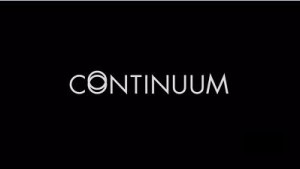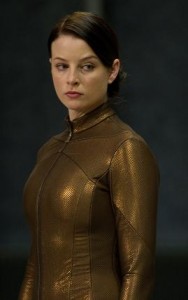 Genuine science fiction is, thankfully, more common on TV than it is in the movies. Most “science fiction films” are really horror films or simple action films gussied up with spaceships, ray guns, or other “sci fi” elements that amount to little more than window dressing (see Event Horizon, Demolition Man). But when a TV show tells us it’s science fiction, it often is, on the more fundamental conceptual level that makes the difference—the ramifications and consequences of the science fictional ideas, like brain re-writing (as in Dollhouse) or artificial intelligence (as in Caprica) are thought through and pursued, rather than just a surface-level superpower that the cop can use to catch the bad guy in the last act (as in, oh, about three quarters of Glen A. Larson’s TV shows).
Genuine science fiction is, thankfully, more common on TV than it is in the movies. Most “science fiction films” are really horror films or simple action films gussied up with spaceships, ray guns, or other “sci fi” elements that amount to little more than window dressing (see Event Horizon, Demolition Man). But when a TV show tells us it’s science fiction, it often is, on the more fundamental conceptual level that makes the difference—the ramifications and consequences of the science fictional ideas, like brain re-writing (as in Dollhouse) or artificial intelligence (as in Caprica) are thought through and pursued, rather than just a surface-level superpower that the cop can use to catch the bad guy in the last act (as in, oh, about three quarters of Glen A. Larson’s TV shows).
That little rant leads us to the tremendously enjoyable new series Continuum, currently airing on SyFy. While it does function as a typical police procedural a lot of the time, it makes copious and intelligent use of its science fictional premises, so that while you’re getting sucked into the “find the bad guy, save the victim” episodic plots you’re also watching interesting ideas getting worked through in a surprisingly satisfying way. Bottom line, if you have a history of enjoying science fiction and you’re not watching this show, allow me to show you the error of your ways.

Rachel Nichols as Kiera Cameron in Continuum (Photo © Showcase/Shaw Media)
Rachel Nichols stars—and I do mean stars—as Kiera Cameron, a “Protector” (law-enforcement officer) in the year 2077 who relies on technology, in the form of an enhanced bodysuit and cybernetic implants. In her future world, the traditional government has collapsed and been replaced by a “Corporate Congress.” A terrorist group that calls itself “Liber8” sets off an explosion in the Corporate Congress building, killing thousands of people, after which the core members of the group are apprehended and sentenced to death. But someone has slipped them a time travel device, and instead of being executed they are sent back in time sixty-five years, to 2012—and Kiera gets caught in the area of effect, getting transported back as well.
Now, once upon a time, this is where we the audience would be subjected to an endless succession of fish-out-of-water scenarios, where Kiera’s ignorance of current-day customs would be played for the broadest humor. Thankfully, that’s not the case with Continuum. Through a complicated but quite clear set of circumstances, Kiera finds herself in contact, via her implanted tech, with a young man named Alec Sadler (played by Erik Knudsen, who I remember fondly as decent-but-troubled teenager Dale Turner on Jericho) who will one day invent that very same tech. With Alec’s help, Kiera is able to pass herself off as a government agent and allies herself with a Vancouver police detective named Carlos Fonnegra (Victor Webster, known to genre fans as Mulwray on the syndicated Mutant X and Coop the cupid on Charmed). With the Liber8 terrorists on the loose and employing their usual, ruthlessly murderous tactics to prevent the corporate-controlled future from coming to pass, Kiera does everything in her power to keep them from changing her future, the one that contains her beloved husband and son.
The elephant in the room here is the strange moral complexity—as seen through Kiera’s eyes, the world of the future is a relatively benign one in which she lives a comfortable middle-class existence with her husband and young son, but it’s quickly made clear that despite their pleasant life and all the snazzy, video-bearing skyscrapers that dominate their city skyline (shades of Blade Runner and and the short-lived but much-missed Max Headroom TV series), that future is also a dystopia full of government surveillance, injustice and oppressed have-nots. It’s easy to see parallels to today’s world, in which economic inequality is facilitated by the (willful?) ignorance of the comfortable, and to view the goal of such a system’s downfall as desirable. Yet the sympathetic hero of our story represents the law and order of that system, while the “freedom fighters” who seek to destroy it kill thousands of innocents as collateral damage in their “by any means necessary” campaign of terror.
At no point in this show is it made easy to know what to believe, and that challenging ethical foundation is one of Continuum‘s most appealing features.

Continuum‘s Blade Runner-esque skyline of 2077 (Photo © Showcase)
As I mentioned, the sci-fi elements—most notably the time travel ideas and Kiera’s future tech—are handled smartly, with real thought given to the consequences of things like Alec interacting with a fully-developed version of technology he has yet to invent.
But I don’t want to make it sound like it’s all technobabble and philosophical hand-wringing, ’cause it’s not. Continuum‘s true strength lies in the way it keeps the real drama personal, and the way it keeps a ridiculous number of storytelling balls in the air without ever losing its clarity—solidly-written police drama centered around Fonnegra’s department and its recurring encounters with Liber8, Kiera’s evolving friendship with Fonnegra, an engagingly ambiguous Liber8 traitor named Kellog (Stephen Lobo), the suspicions of the police department’s IT genius Betty Robertson, and the worrying similarities between Liber8 and the grassroots meetings run by Alec’s step-father Roland and surly step-brother Julian. The overarching plot is constantly evolving in ways that have made it pretty addictive, at least for me.
The ten-episode first season originally aired on Canada’s Showcase channel from May through August of last year. Eight of those episodes have aired on SyFy as of this writing, and the season will be released on DVD and Blu-ray on March 26. A second season will debut in Canada on April 21.
With its intelligent attention to its scientific conceits and a skillfully-wrought plot that is complex but clear, Continuum is definitely “real” science fiction, and it’s on our TVs now. Support good sci-fi on TV: Watch Continuum.